Review of Networked
Theology: Negotiating faith in digital culture
Beyond AD 2000 by Bishop Hwa Yung
Territorial Spirits and World Evangelisation
A biblical, historical and missiological critique of Strategic-Level Spiritual Warfare
by Chuck Lowe
Lovelace F, Richard. (1985).
Renewal As a Way of
Life: A Guidebook for Spiritual Growth
Wilkinson, Bruce.(1999). Experiencing Spiritual Breakthrough: The
Powerful Principle of the Three Chairs
Fowler, James W. (2000). Becoming Adult, Becoming Christian: Adult
Development & Christian Faith
Palmer, Parker J.,1983.
To Know as We are Known: A Spirituality of Education.
Astley, Jeff and Francis, Leslie J. (eds).1992.
Christian Perspectives
on Faith Development
Botton K, King,C & Venugopal, J.
(1997). Educating for spirituality. Christian
Education Journal, Spring, 33-48 and Gorman, J. 1990. Christian
formation. Christian Education Journal, 10, 2 (Winter), 65-73
Laurie Beth Jones,( 2005). The Four Elements of Success
Blanchard, Ken & Hodges,
Phil. (2003). The Servant Leader: Transforming your heart, head, hands
& habits. Nashville TN: J. Countryman
Brock, Timothy W. The Role of the
Congregation on Christian Education as Christian Spiritual Formation,
Review and Expositor, 98. Summer 2001, 369-393
Cullinan, Alice R.
(2001). The Role
of Schooling in Christian Education as Spiritual Formation. Review
and Expositor, 98: 395-410
Galindo, Israel.
(2001).Methods of Christian Education toward Christian Spiritual
Formation. Review and Expositor. 98 (Summer): 411-429
Fortosis, Stephen.
(2001). Theological Foundations for a Stage Model of Spiritual
Formation. Religious Education. Vol. 96. No.1.(Winter): 49-63
|
Matthaei, S. H. (2004). "Rethinking Faith
Formation." Religious Education 99(No.1. winter): 56-71.
Johnson,
Susanne. (2001).
Christian Spiritual Formation in An Age of “Whatever” Review and
Expositor, vol.98 no.3 Summer: 302-332
Johnson,
Susanne. (1989) Christian Spiritual Formation in the Church and Classroom,
Nashville: Abingdon Press
Barns, Ian (2002), Becoming Theologically
Reflective Practitioners in Professional Life, Journal of Christian
Education, Vol.45, No. 2, September : 7-20
Wright, N.T. "God, 9/11, the Tsunami, and the
New Problem of Evil." Response, Summer 2005.
Danny Yap, Everyone Needs a Plan: Making It
to the Million Dollar Round Table and Beyond (Johor Bahru, Malaysia:
Springfield Consultancy Sdn Bhd, 2004)
Barnable Conrad and Monte Schulz (eds.) Snoopy’s Guide to the Writing Life (Cincinatti,OH: F&W Publications,
Inc: 2002)
Ravi Zacharias (with R.S.B. Sawyer), 2006
Walking from East to West: God in the Shadows (Grand Rapids, MI:
Zondervan)
Cooling, Margaret., 2005, Creating a
Learning Church: Improving Teaching and Learning in the local church
(Oxford: The Bible reading Fellowship)
Rutter, Mark V., A
Holistic Approach to Learning: The Key to Change, Christian
Education Journal, Spring 1990, Vol X. No3. p63-7
Groome, Thomas H., 1980,
Christian Religious Education: Sharing Our Story and Vision. San
Francisco: Jossey-Bass
Barna, George, 2005, Revolution: Finding Vibrant Faith
beyond the Walls of the Sanctuary, Carol Stream, IL: Tyndale House Publishers.
Buford, Bob.2001. Stuck in Halftime:
Reinventing Your One and Only Life. Grand Rapids. MI: Zondervan
Zinsser, William. 2006. On writing
well: The classic guide to writing non-fiction. New York:
HarperCollins Publishers.
Yancey, Philip. 2006. Prayer: Does it make
any Difference? London: Hodder and Stoughton.
Scarrow, Simon 2006 The Eagle in
the Sand London : Headline

Coonts, Stephen 2006, Traitor (London:
Orion Books)

Wong,Gordon 2006, Faithful to the End: The
Message of Daniel for Life in the Real World (Singapore: Genesis
Books)
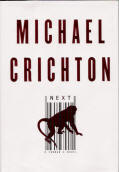
Crichton, Michael 2006, NEXT
(New York: HarperCollins Publishers)

Sweet, Leonard (ed.) 2003, The
Church in Emerging Culture: Five Perspectives (Grand Rapids,
Zondervan)
Shane Hipps,(2005) The Hidden
Power of Electronic Culture: How Media Shapes Faith, the Gospel, and
Church. (Grand Rapids, MI: Zondervan)
Discovering God in
Ancient China
Hugh Hewitt (2005) Blog: Understanding the
Information Reformation that's Changing Your World
Sweet, Leonard (2007), The
Gospel According to Starbucks: Living a Grande Passion, Colorado
Springs, CO: Waterbrook Press).
Paul Levinson (2006), The Plot to Save Socrates, (New York: Tor Books)

Warren Murphy and Richard Sapir
(2007) The Best of the Destroyer
What About Those Who Have
Never Heard?
Mother Teresa, (2007)
Come Be My Light: The Private Writings of the "Saint of Calcutta" (New
York: Double Day)
Calvin Miller (2006),
Preaching: The Art of Narrative Preaching
(Grand Rapids. MI: Baker Books)
Marcia J. Bunge (ed)(2001) The Child in Christian Thought (Grand Rapids, MI: Eerdmans).
Richard and Rachael Hiller (2007), The
13th Apostle, New York: HarperCollins Publishers.
Beauregard, Mario and O’Leary, Denyse (2007),
The Spiritual Brain: A Neuroscientist’s Case for the Existence of the Soul, New York: HarperCollins Publishers

Tod Lindberg (2007), The Political Teachings of Jesus, New York: HarperCollins Publishers.
Stephen Hunter (2007) The 47th Samurai,
New York: Simon & Schuster.

Making Money in Ang
Morpork (2007) Terry Prachett

Book review on the
Yellow Lighted Bookstore

Campolo, Tony & Darling, Mary Albert. 2007. The God of Intimacy and Action: Reconnecting Ancient Spiritual Practices, Evangelism, and Justice. San Francisco: Jossey-Bass.

Amir Aczel, The Jesuit and the Skull

Jacobs, A.J. (2007) The
Year of Living Biblically: One Man’s Humble Quest to Follow the Bible as
Literally as Possible. New York: Simon & Schuster

James Waterson (2007) The Knights of Islam: The Wars of the Mamluks,
London: Greenhill Books.

Jeremy Beckett, Tessellating: Starting out in Medicine and Dentistry, Where faith meets practice, Christian and Dental Medical Fellowship of Australia.
 I
I
Benson L. Benson
and Carolyn H. Eklin, Effective Christian
Education Study: A National Study of Protestant Congregations, A Summary
Report on Faith, Loyalty, and Congregational Life, Search Institute,
Minneapolis; March 1999

McLaren, Brian (2008), Finding Our Way Home: The Return of the Ancient Practices, Nashville, TN: Thomas Nelson
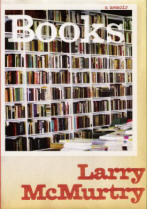
Larry McMurtry, 2008, Books: a memoir, New York: Simon & Schuster
Blown2Bits: A Digital Explosion

This 2008 book is written by Hal Abelson, Professor of Computer
Science and Engineering at MIT, Ken Ledeen, Chairman/CEO of Nevo
Technologies and Harry Lewis, former Dean of Harvard College, Gordon
McKay Professor of Computer Science at Harvard.
The question this book seeks to answer is how the digital explosion
will affect life, liberty and happiness. Since this book is written
for the North American context, it nevertheless gives some answers
to the rest of the world.
Much of the book deals with the tremendous technological leap that
took us from there to here. It also identifies two groups of people
in North America; these before and after the Internet. Obviously the
new generation is more computer savvy and more at home on the Net.
The book raises the issues of copyright (intellectual properties,
movies, songs etc) and of personal privacy. The free availability of
information (bits) has in many cases forces us to redefine copyright
and privacy. Again, the younger generations is more relaxed with
these two issues. Note the amount of files being exchanged and the
amount of personal information that is being uploaded voluntarily to
social networking sites, blogs and websites. This is an interesting
book, while not providing trends or answers, gives we something to
think about as we run for cover in the digital explosion.
Theological Guide to Calvin's Institute
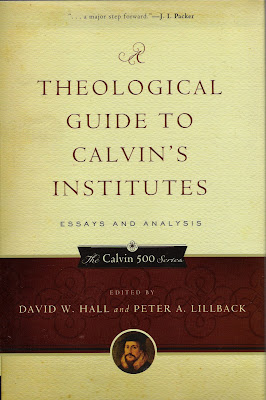
David Hall & Peter Liliback (Ed)(2008)
Theological Guide to Calvin's
Institutes: Essays and Analysis, Phillipsburg, NJ: P&R
Publishing
One of John Calvin's greatest legacy is his book,
Institutes of the Christian
Religion. In its final edition (1559), it was a great piece
of writing in systematic theology. This year, the 500 anniversary of
his birth, one of the Calvin 500 project was to engage and update
the
Institutes.
The contributors of this book is a formidable list of who's who of
Reformed theologians. (Why is there no female?) Each is a specialist
in Calvin's
Institute. It
is a pleasure to read as each engages with the Institute with his
expertise and context.
This book is an excellent example of the motto of the Reformed
tradition,
Reformed and always
reforming.
Ian Randall: Spiritual Revolution
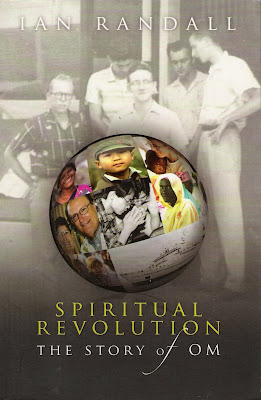
Ian Randall (2008),
Spiritual
Revolution: The Story of OM, Milton Keynes, Bucks : Authentic
Media
There have been many books on the history of Operation Mobilisation
(OM) but this book is unique in that it was issued on the 50th
anniversary of the organisation. Randall set out to tell of God's
faithfulness in the formation, ministries and sustaining of
Operation Mobilisation International. It started with
George Verwer's
conversion as a teenager in New York. Today OM has its presence in
over 100 countries with more than 5000 workers.
The book highlights the various ministries of OM; short term
missions, evangelism, literature evangelism, ships and sharper of
young lives. It is especially meaningful for me as it has influenced
me when I was a young Christian and I am in contact with others who
have also been influenced by the organisation. One of them now
teaches in a Bible school in Kuala Lumpur while another is a
missionary in China. There is an appendix at the end of the book
which records ministries started by former OMers and also another
list of books written by former OMers.
OM is truly a spiritual revolution involving a team of people
dedicated to missions and in the saving of the lost. I strongly
recommend this book to those who want to know more about OM.
Moses Tay: Born for Blessings
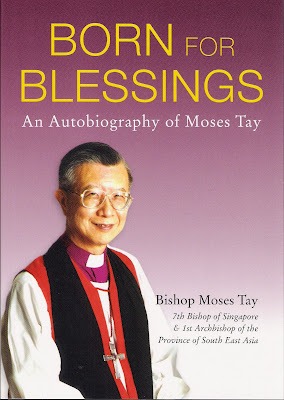
Tay, Moses (2009),
Born for
Blessings: An Autobiography of Moses
Tay,
Singapore, Genesis Books.
I am always curious about people who writes their own
autobiographies. Moses Tay is a medical doctor who was the Director
of Tan Tock Seng Hospital in Singapore before he resigned to take up
the post of the 7th Bishop of Singapore (1982-2000) and the 1st
Archbishop of South East Asia (1996-2000).
In this highly readable autobiography, Moses Tay set out to narrate
the story of his life. It is wonderful to read about his faith and
God's bountiful blessings in each of the stages of his life.
However, personally I will like to read more about the inner Moses
Tay; his struggles, his formative factors and his regrets (if any).
This book will serve as a useful resource for students of Christian
history in Malaysia and Singapore, and also of the Anglican
community.
Festchrift to Chow Lien Hwa
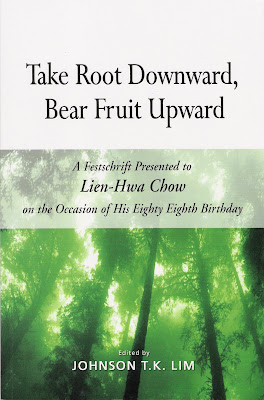
Johnson Lim (ed) (2008)
Take Root
Downward, Bear Fruit Upward: A Festschrift Presented to Lien-Hwa
Chow on the Occasion of his Eighty Eighth Birthday, Hong
Kong: Asia Baptist Graduate Theological Seminary.
Chow Lien Hwa is known as the"Father of Asian Baptists." He is a
pastor, scholar, teacher and a mentor to many Baptists around the
world. His untiring work of teaching and writing is based on his
belief that it takes three generations before contextualisation can
fully take place.
This festschrift is a love-gift from Baptist theologians and pastors
from around the world but mostly from Asia. It is heartening to read
and appreciate the level of scholarship that is developing in Asia.
These articles are mainly in the area of hermeneutics though it is
heartening to read Dr Sunny Tan's (Dean, Malaysia Baptist Seminary)
call for Pastor-Theologians and Dr Johnson Lim's (Research Director,
Asian Baptist Graduate Seminary-Singapore) on the original sin.
LustBader: The Bourne Sanction
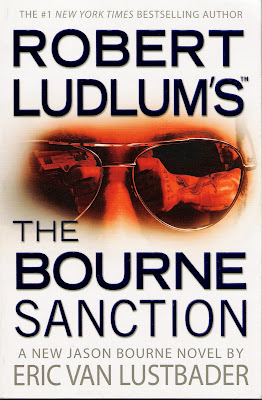
In
this 2008 book, Eric Lustbader continues the adventures of Jason
Bourne, a character created by Robert Ludlum.
Jason Bourne is the 21st century ultimate secret agent as James Bond
is the agent for the 20th century. The interesting twist is that
Jason Bourne does not exist but is an alter-ego created by the CIA
to catch Carlos the Assassin as seen in Ludlum's trilogy:
The
Bourne Identity, The
Bourne Supremacy and
The
Bourne
Ultimatium. These have been made into movies. Eric
Lustbader took up writing Jason Bourne thrillers and so far has
produced two:
The
Bourne Betrayal and now,
The
Bourne Sanction.
Eric Lustbader is a good choice to take up the mantle of Ludlum
in writing Jason Bourne stories. I have enjoyed his
Nicholas Linnear novels and
China Mardoc novels.
This book took up with the life of David Webber, who is the real
person. Jason Bourne is a created personality. David is teaching in
an American college and having an identity crisis. He does not know
whether his real persona is Jason Bourne or David Webber. This
reminds me of The Batman/Bruce Wayne.
As in other stories, this weakness is manipulated by others. This
time it is the Russian mob, an ultra secret terrorist organisation,
and the CIA. In the pursue of his mission, Bourne leaves behind a
trail of destruction and dead bodies. I like this book which has
people double and triple crossing each other and thus is a
mystery-thriller. What strikes me as I read these books is that
basically David Webber and Jason Bourne has a deep sense of decency
and loyalty to his friends. I look forward to the movie.
Related postings
The Quest for Jason Bourne
The 20 greatest fight scenes ever
Outliers: Malcolm Gladwell

Malcolm
Gladwell (2008),
Outliers: The
Story of Success (New York: Harchette Book Group).
One of my observation is that most medical students who scored
well in their assessment examinations during their long medical
courses do not do well and become successful medical
practitioners after they graduate. Of course, there are rare
exceptions. Usually those who are average and sometimes
borderline passes do well in their lives after graduation. I
have often wondered about this.
Malcolm Gladwell, the author of
Blink: the power of thinking
with thinking and
The
Tipping Point: how little things can make a big difference
offers some insights into this. Gladwell is an insightful
author, looking behind the obvious to gives us a more obvious
answer.
Outlier (noun) means:
(1) something that is situated from or classified from a main or
related body, and
(2) a statistical observation that is markedly different in
value from the others of the sample.
In an average mean chart, an outlier will be a person who is
either in the top or bottom 10% of the mean.
Gladwell tried to analyse the lives of successful men and women,
those whom he calls 'outliers' to discover the secret of their
successes. As in the previous books, he balanced his arguments
with facts and anecdotes. His theses are both fascinating and
obvious.
There is a limitation to what genetics can offer a person. For
example, IQ. The higher the IQ a person has does not
automatically translate to a more successful life. In fact,
there is no advantage to being a success beyond a 120 IQ points.
Galdwell's theses has a lot to do with nurture. Given a person
with average intelligence, these are the factors that will help
make a person a success:
(1) Nurture
both in families and communities that produce an higher EQ. It
is the high EQ that is a determining factor. The nurture of EQ
seems to be better in higher income families and in families who
are concerned to help their children grow.
(2) Opportunities
one example quoted is Bill Gates who in high school was given
the opportunity to learn from the very best computer code
writers and be allowed a job to write computer codes himself
while as a high school student.
(3) Cultural legacies
such as the Asian culture of hard work ( Asian students tend to
score well in Maths) which produce successful people and the
hierarchical system in Asia which inhibits individual initiative
and thus inhibits success (example the high rate of airplane
crashes in Korean Air in the past).
It will be useful if Gladwell defines what he meant by success
instead of mentioning men and women who "did things out of the
ordinary" and launched into various biographies and
autobiographies. My gleaming of what he meant by success is
something very achievement-orientated, secular and
individualistic. There is no spiritual or moral element in his
definition of success. It will be useful to include these two
elements into his group of 'outliers' and see how many still
remains after this two criteria are added.
Another problem I have with this book is the way data from some
researches are used. I find it hard to understanding how the
hard work related to rice farming in China is linked to Asian
children doing better in Maths. While it it true that rice
farming demands hard work, it is a leap of faith to declare that
the Chinese cultural legacies of hard work is related to the
rice field and also to Asian children doing well in Maths.
Another explanation offered in why Asia children do better in
Maths is that numbers in English is longer that the same numbers
in Mandarin. For example the pronunciation of the numbers: 7 in
English is double syllable se-ven, while in Mandarin is
monosyllable. Also English has more number names than Mandarin;
English-eleven ,twelve, thirteen... while in Mandarin, Korean
and Japanese, it is more logical- ten-one, ten-two, ten-three...
My impression is that Galdwell has formulated his theses first
and then find studies to support them, i.e. he is working
backwards. Thus he was very selective in his choice of
literature. On the whole this is an interesting book to read. I
am amazed at the varieties of studies Galdwell has dug up.
The Return of the Prophet
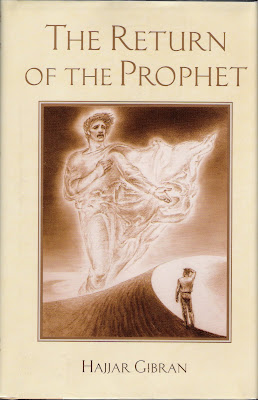
Hajjar
Gibran (2008),
The Return of the
Prophet (London: Simon & Schuster UK Ltd).
I am a great fan of the writings of Kahlil Gibran especially of his
book,
The Prophet (1923)
which I have blog
here. So it is with much anticipation when I read Hajjar
Gibran's book.
Hajjar Gibran claimed Kahlil Gibran to be his great-uncle.
However, in a note in the end of the book, he reveals that they are
more of distant relatives.
This book is autobiographical in nature with Hajjar attributing his
spiritual awakening to visions and conversations with the Prophet of
Kahlil Gibran. It documents his journey from despair at the death of
his brother to his wild life and spiritual awakening. Then of his
development of spiritual insights and success in Hawaii.
While the writing style imitates that of Gibran's masterpiece, it
lacks the spiritual depth and wisdom of the book. Hajjar's work is
more of a journal of a spirit channeling. Spiritual discernment is
required to read this book.
Lawrence Khong's Give Me the Multitudes
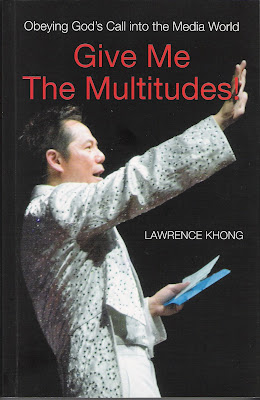
Lawrence
Khong (2008)
Give me the
Multitudes! Obeying God's Call into the Media World, TOUCH
Ministries International: Singapore
Lawrence Khong is the Founding Senior Pastor of the 10,000 strong
Faith Community Baptist Church in Singapore. He has been
commissioned as an Apostle by Dr Peter Wagner of the International
Coalition of Apostles and is a member of Pastor Cesar Castellanos'
International G12. He is also the Founding Chairman of TOUCH
Community Services, a registered non-profit welfare organisation
that serves the needy, and the Founding Chief Execuitive Officer of
Gateway Entertainment, an entertainment production business that
stages mega magic shows like
Magic
of Love (from the book burb).
This little booklet of 119 pages, large fonts with 1.5 spacing
format and a few pages of black and white photos is an autobiography
by Khong about the last six years in which he was involved in his
magician/illusionist
Magic of Love
stage magic/dance/musical production.
Though an autobiography, it comes across as an attempt to justify
his involvement with the
Magic of
Love. As I was reading it, I was wondering why is there a
need to justify his actions if the call from God for him was to
begin an apostolic ministry in the 'media and entertainment scene'
to win the lost. It is good to know that his interest in magic/illustionist
acts began when he was a child and remained his hobby. It is also
good to know that he thinks that his
Magic of Love may be a
platform for him to share Christ with unbelievers. The telling of
his daughter's out of wedlocks pregnancy and the neglect of his son
by the show is of human interest but did not further the
justification of his action.
It is my personal opinion that after reading this book that Khong
may need to let go of being a pastor if he is to seriously consider
entering into the world of media and to win it for the Lord. Being a
pastor is a handicap because no non-Christian will take his shows
seriously if he is still linked to the church. To them, this is just
another Christian evangelism gimmick.
Khong also need to be careful in his choice of theme for his shows.
The
Magic of Love is a good
them because it tells of the love between a father and his daughter.
However, the "Spooky Show" may be a gray area.
Finally, Khong must realise that he is not alone. Maybe he has been
a pastor too long that he has forgotten that thousands if not
millions of Christians are involved in 'marketplace ministries' and
many of them in the media. He writes as if he discovered the
marketplace ministry all by himself.
On the whole, it is a good book to read. I have a better
understanding of Lawrence Khong and his ministries.
Isaiah's Immanuel
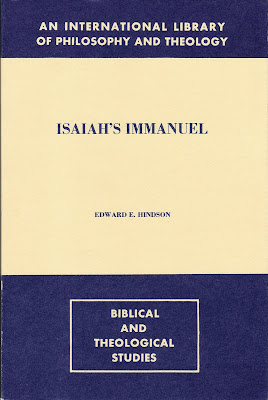
Edward Hindson (1978),
Isaiah's Immanuel (Phillipsburgh,
NJ: Presbyterian and Reformed Publishing Co )
Edward Hinson was professor of religion at Liberty University,
Lynchburg, Virginia. He is an Old testament scholar.
This is a 'meaty' scholarly thesis on Isaiah 7:14. There are
three possible intepretation of the 'virgin' in the verse
(v.14-16):
(1) The boy of whom Isaiah wrote was conceived shortly after
Isaiah spoke this message. A young woman, a virgin, married and
then had a baby. Before he would be old enough to tell the
difference between good and evil the northern Aram-Israel
alliance would be destroyed. According to this view the woman
was a virgin when Isaiah spoke his prophecy but was not when the
boy was born because he was conceived by sexual relations with
her husband. Some say this child was born to Isaiah (8:3-4).
They point out that 8:1-4 corresponds in a number of ways to
7:14-17.
(2) A second view sees the predicted birth as exclusively
messianic and the virgin as Mary, Jesus’ mother. It is argued
that in Isaiah 7:14 the virgin is said to be with child (lit.,
”the virgin is or will be pregnant“). It is also argued that
Matthew, stressing the fact that Joseph and Mary’s marriage was
not consummated till after Jesus’ birth (Matt. 1:18, 25),
affirmed that Jesus’ birth fulfilled Isaiah’s prophecy (Matt.
1:21-23).
(3) A third view, a combination of the first two, sees the
prophecy as directed primarily to Ahaz regarding the breaking of
the alliance. The ‘almâh was a virgin when Isaiah spoke his
message, but then she would marry and have a baby. When the
Aram-Israel alliance was broken the boy would still be young.
Hindson's thesis is that “(A)n evaluation of the evidence
reveals that Isaiah did in fact predict directly and in advance
the birth of Jesus Christ by Mary, the virgin of Nazareth.”
(p.87) i.e. option number 2. Aside from the exegesis of the word
'virgin', Hindson seeks support from the Septuagint’s
interpretation of Isa. 7:14 as that of a virgin birth. This
messianic pre-Christian interpretation is shared by the
rabbinic, Palestinian and Alexandrian Jews.
Option one is to be rejected because (a) Isaiah’s wife already
had a child (Shear-Jashub, v. 3) and so was not a virgin, (b)
the second child born to Isaiah’s wife was not named Immanuel
but
Maher-shalal-hash-baz which is a judgment on Judah
while Immanuel is one of hope (8:3),(c) the virgin is Isaiah’s
second wife which has no scriptural backing, and (d) there is no
virgin birth. If option one is not acceptable, option 3 of
double fulfilment is also not acceptable.

Tanks changed the concept and strategy of warfare as the horse did many centuries before. It was with the skillful use of tanks that Hilter and his generals were able to capture Europe and Paris so rapidly during the beginning days of the Second World War.
Tanks was first introduced during the First World War. Initially it was unreliable and as dangerous to its drivers as to the enemies. Christy Campbell, a former war correspondent for the Sunday Telegraph gave an interesting and readable account of early tank warfare.
I had a good time reading it.
.
 Ernesto 'Che' Guevara has always fascinated me. Together with Fidel Castro, these young idealists armed with idealism and little else set forth to fight a powerful, ruthless and corrupt government. That they were successful is a matter of history.
Ernesto 'Che' Guevara has always fascinated me. Together with Fidel Castro, these young idealists armed with idealism and little else set forth to fight a powerful, ruthless and corrupt government. That they were successful is a matter of history.
Che, the man always eluded me. After being Minister for Industry in Cuba, he left it to start a guerrilla warfare in Bolivia. It was a successful campaign as guerilla warfare goes. Che, himself was captured and executed in 1967.
This book is a record of his thoughts on guerrilla warfare. While reading it, I thought it gives me a glimpse of the man - pragmatic, idealist, and yet ruthless. He would have been a good "Watchmen."
I feel a certain kinship as Che was trained as a doctor but found that political revolution helps more people than his medical skills. I do not necessary agree with all his political views and his methods, but I have learned to respect the man.
More about Che from Time magazine here and of course, Wiki here.
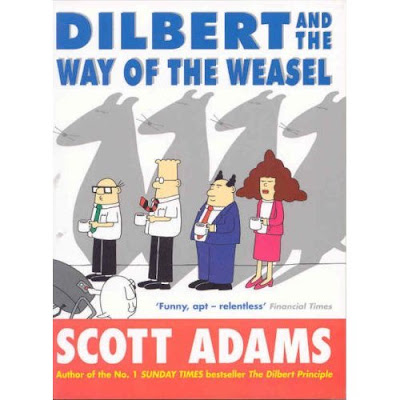 I have had a great time reading this book. I like Scott Adams' sense of humour and I have enjoyed his other books, The Dilbert Principle and The Dilbert Future. This book is even funnier and oh so true.
I have had a great time reading this book. I like Scott Adams' sense of humour and I have enjoyed his other books, The Dilbert Principle and The Dilbert Future. This book is even funnier and oh so true.

Killing Rommel by Steven Pressfield

A Darker Place by Jack Higgins
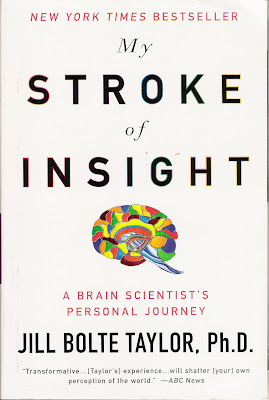
Jill Bolte Taylor,
My Stroke of Insight (London:
Penguin Books, 2006)
Dan Brown's The Lost Symbol
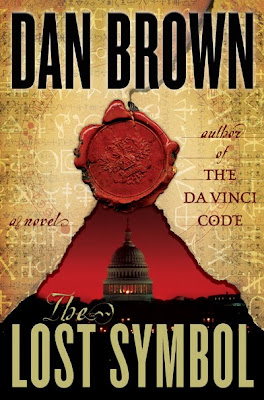
Dan Brown's latest offering of the exploits of Harvard Symbologist
Professor Robert Langdon is another round of conspiracy theories,
symbols, ambitious people and murders. This time it is located in
Washington D.C. and involves the Freemasons and Ancient Mysteries.
There is a lot of Masons mythos in this novel, too much in fact that
at times it reads like a non-fiction book. Surprisingly for a best
selling novelist, the character development is poor and
inconsistent, and the writing is choppy. The writing and
storytelling is not as smooth as in his previous books.
Nevertheless, it is an excellent book to read for relaxation for a
few hours.

Read this
review by Ben Witherington.
The Genesis Enigma by Andrew Parker
Bruce Demarest (2009), Seasons of the Soul: Stages of Spiritual Development, Downers Grove IL: IVP Books
Book Notes on
Alan Andrews (ed.), (March
2010), The Kingdom Life: A Practical Theology of Discipleship
and Spiritual Formation, Colorado Springs, CO: NavPress.
Book Review on The Element by Sir Ken Robertson
The Emperor's Tomb
Spartan
Tim Challies, (2011), The Next Story: Life and Faith after the Digital
Explosion, Grand Rapids, MI: Zondervan.

Lim Ka-Tong,
2012, The Life and Ministry of John Sung, Singapore: Armour
Publishing
Christine
Sine, executive director, liturgist and chief gardener of
Mustard Seeds Associates and
her blog Godspace
is a one of the innovators of the contemporary Christian
contemplative tradition. In this delightful book which is aptly
named Return to our senses: Re-imagining how we pray,
Christine challenges our perception of how and why we pray.
Christine argues that though there is great value in verbal
prayers, there is more to praying than using our cognitive
“senses.” To her, our sense of sight, smell, touch, hearing and
taste are also means to praying.









































